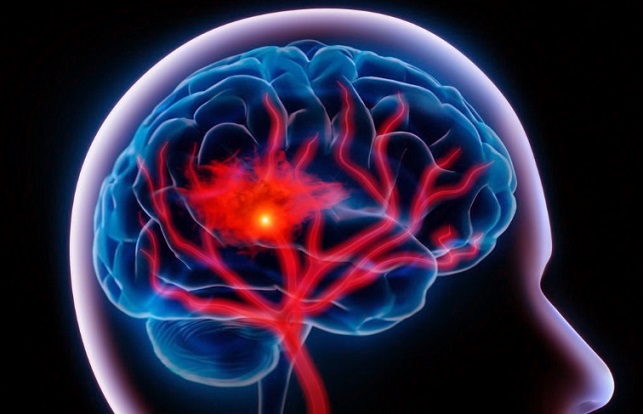SARS-CoV-2 Increases Plasma VWF Levels and Decreases ADAMTS13 Activity, Raising Risk and Worsening Outcomes of Stroke
Nikhil Prasad Fact checked by:Thailand Medical News Team Jan 12, 2025 3 months, 4 days, 14 hours, 50 minutes ago
Medical News: Unveiling the Connection Between COVID-19 and Stroke
Recent scientific investigations have shed light on the disturbing link between SARS-CoV-2, the virus responsible for COVID-19, and an increased risk of severe stroke. A study conducted by researchers from the University of Iowa-USA and the Versiti Blood Research Institute, Wisconsin-USA, explores how this virus impacts the delicate balance between von Willebrand factor (VWF) and ADAMTS13, two critical components in blood clot regulation. This imbalance exacerbates stroke severity and worsens patient outcomes. This
Medical News report examines the findings in detail, aiming to make the complex science behind them easy to understand.
 SARS-CoV-2 Increases Plasma VWF Levels and Decreases ADAMTS13 Activity, Raising Risk and
SARS-CoV-2 Increases Plasma VWF Levels and Decreases ADAMTS13 Activity, Raising Risk and
Worsening Outcomes of Stroke
The Role of VWF and ADAMTS13 in Stroke
VWF is a protein essential for blood clotting. It helps platelets adhere to damaged blood vessels to prevent excessive bleeding. However, if not regulated properly, VWF can lead to excessive clotting, increasing the risk of strokes and other cardiovascular events. ADAMTS13, an enzyme, prevents such complications by breaking down oversized VWF molecules into smaller, manageable fragments.
When the balance between VWF and ADAMTS13 is disrupted, as observed in infections like COVID-19, the body becomes prone to clot formation, which can block blood flow to the brain, causing strokes. This study provides direct evidence of how SARS-CoV-2 drives such imbalances.
SARS-CoV-2’s Impact on VWF and ADAMTS13
The research team, including Rakesh Patel, Anil Chauhan, and their colleagues, used mouse models to study the effects of SARS-CoV-2 and bacterial respiratory infections like Staphylococcus aureus on the VWF-ADAMTS13 axis. They observed that both infections significantly increased plasma VWF levels while reducing ADAMTS13 activity. In SARS-CoV-2-infected mice, this imbalance was more pronounced, with a nearly fourfold increase in the VWF/ADAMTS13 activity ratio compared to mock-infected controls.
Notably, this study highlights that such imbalances were associated with larger brain infarcts - areas of dead brain tissue caused by interrupted blood flow - and worse neurological outcomes. Infected mice showed heightened inflammation, evidenced by increased levels of cytokines like interleukin-6 (IL-6) and chemokines such as CXCL1 and MCP-1, which further aggravated stroke severity.
Experimental Approach and Key Findings
The study employed a sophisticated approach, infecting mice with sublethal doses of SARS-CoV-2 and subjecting them to induced strokes. Researchers then evaluated stroke severity using advanced imaging techniques and behavioral tests. Key findings include:
-Increased Stroke Severity: Mice infected with SARS-CoV-2 exhibited significantly larger infarct volumes and higher neurological severity scores compared to non-in
fected mice.
-Protective Role of ADAMTS13: Mice deficient in ADAMTS13 experienced worse outcomes, confirming the enzyme’s protective role in regulating blood clotting during infections.
-Benefits of VWF Deficiency: Mice lacking VWF showed improved stroke outcomes, indicating that reducing VWF levels could mitigate the risk of severe strokes in respiratory infections.
Implications for Human Health
The study’s findings carry profound implications for understanding COVID-19’s impact on cardiovascular health. It suggests that individuals with pre-existing respiratory infections, particularly COVID-19, are at heightened risk of developing severe strokes due to the disrupted VWF-ADAMTS13 axis. These insights underscore the importance of monitoring and managing this imbalance in COVID-19 patients to prevent adverse neurological outcomes.
Potential Therapeutic Strategies
Targeting the VWF-ADAMTS13 axis could open new avenues for stroke prevention and treatment. For instance, therapies aimed at reducing VWF levels or enhancing ADAMTS13 activity may help restore balance and protect against severe stroke outcomes. Existing treatments, such as recombinant ADAMTS13, have shown promise in preclinical studies and could be further explored in the context of COVID-19-related strokes.
Conclusion: Bridging Research and Clinical Practice
The groundbreaking work by the University of Iowa and Versiti Blood Research Institute researchers provides critical insights into the complex interplay between respiratory infections and stroke risk. It confirms that SARS-CoV-2 not only exacerbates stroke severity but also unveils potential therapeutic targets to mitigate these risks.
This study emphasizes the need for heightened vigilance in managing COVID-19 patients, particularly those at risk of stroke. By understanding the molecular mechanisms underlying this connection, researchers and clinicians can develop targeted interventions to improve patient outcomes.
The study findings were published in the peer-reviewed journal: Blood Advances.
https://www.sciencedirect.com/science/article/pii/S2473952925000138
For the latest COVID-19 News, keep on logging to Thailand
Medical News.
Read Also:
https://www.thailandmedical.news/news/pittsburgh-study-finds-that-exposure-to-red-light-reduces-risk-of-blood-clots-and-stroke
https://www.thailandmedical.news/news/folate-levels-and-stroke-risk
https://www.thailandmedical.news/news/how-salidroside-helps-protect-the-brain-after-stroke
https://www.thailandmedical.news/news/amino-acids-in-brain-fluid-linked-to-higher-stroke-risk-and-recovery-outcomes
https://www.thailandmedical.news/news/genetic-clues-reveal-how-covid-19-may-trigger-ischemic-stroke-risk
https://www.thailandmedical.news/news/study-on-dietary-habits-and-stroke-unveils-surprising-links
https://www.thailandmedical.news/news/spike-protein-from-sars-cov-2-worsens-stroke-risks
